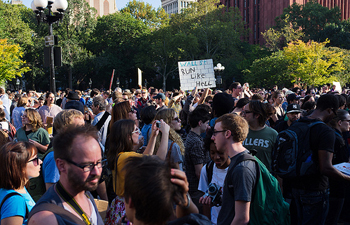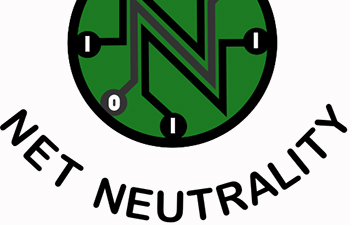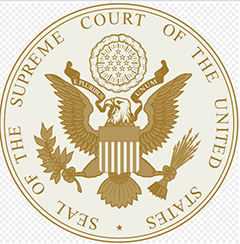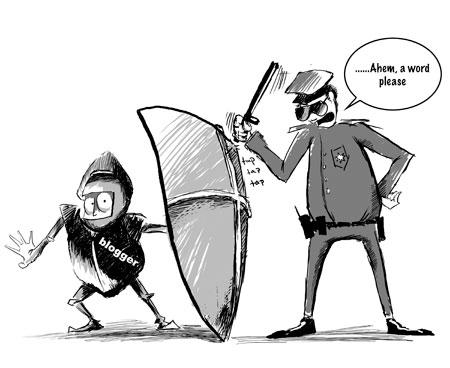
This piece is co-authored by Jeff Hermes and Andy Sellars.
This year turned out to be one that could fit well in a Billy Joel song: peppered protesters, jailed journalists, Internet crusaders … the list goes on. To recap a year that has been chock-full of shifts in media, we put together a list of the top 10 (plus one for good luck) legal developments of 2011.
In an attempt to pare down our list, we primarily considered three factors: 1) What kind of attention did an issue receive from the public, advocacy groups, lawmakers and the courts this year?; 2) How important will an issue be in the years to come?; and 3 To what extent did an issue shift the course of media?
Here’s an Index of the list:
- “Wiretapping” the Police
- Covering Occupy
- Bloggers as Journalists
- Tax-Exempt Journalism Gets Delayed
- Net Neutrality
- Hot News: Still Dodging the Big Questions
- Internet Copyright Enforcement Goes Technological
- Righthaven Is in the Wrong
- The Supreme Court Expands First Amendment Protection
- Cameras in the Courtroom
- Fleeting Expletives
1. “Wiretapping” the Police
“Wiretapping” sounds like it should involve a man in a headset sitting in a van listening in on your telephone calls. But the legal definition is often far broader — as many journalists and ordinary citizens found out after being charged with a felony for simply filming a few seconds of police activity in public.
But citizens have succeeded in challenging some of these arrests on First Amendment grounds. The U.S. Court of Appeals for the First Circuit excoriated three Boston police officers for a wiretapping arrest earlier this year, holding that “a citizen’s right to film government officials, including law enforcement officers, in the discharge of their duties in a public space is a basic, vital, and well-established liberty safeguarded by the First Amendment.”
Similarly, in Illinois a state circuit court judge ruled that the state’s eavesdropping law was “intended to prevent unwarranted intrusions into a citizen’s privacy [and] cannot be used as a shield for public officials who cannot assert a comparable right of privacy in their public duties[.]” The U.S. Court of Appeals for the Seventh Circuit is expected to rule on an ACLU challenge to the constitutionality of Illinois’ eavesdropping law early in 2012.
The importance of the wiretapping cases cannot be overstated. If the government is permitted to prosecute citizens for collecting and disseminating accurate information about acts of official misconduct, specifically when those acts occur in a public place, both citizen and professional journalism — and by extension the public at large — will suffer greatly.
2. Covering Occupy
Reporters familiar with covering police and social unrest will tell you that it is not uncommon for journalists to be swept up in a mass arrest by police eager to clear the streets of misfits. What changed in 2011 was the frequency and brashness of police arresting working journalists in the Occupy camps.
Thus far, journalists all across the country have been swept up while covering demonstrators.
Reporters may be surprised to learn that having a press credential doesn’t always serve as a get-out-of-jail-free card. But normally, there is a mutual understanding among the press and police that working journalists should not be carted off to jail with protestors. And, even when journalists do get caught in a mass arrest like the ones all-too-familiar to Occupy protestors, reporters traditionally have been cut loose once police are aware that they snagged the wrong fish.
That mutual understanding has broken down in the Occupy camps. The problem, according to police, is that anyone can claim to be a “journalist” today, making it impossible to offer anyone special treatment. Indeed, some of the most compelling reports of police action at the Occupy camps have come from members of the public.

The Occupy saga is not just about the press’ attempt to cover the most significant outburst of mass social disobedience in recent memory and police attempts to restrict them. It is also about the most significant question in media today: Who, exactly, is a journalist?
3. Bloggers as Journalists
Indoors and away from the Occupy camps, that perennial question reared its head in 2011 with courts struggling to decide whether bloggers and other social media users are entitled to the same protection of journalists when hauled into court.
In December, an Oregon federal jury entered a $2.5 million defamation verdict against an individual blogger, Crystal Cox. The district court judge rejected many of Cox’s defenses, ruling among other things that bloggers like Cox (and essentially everyone else who is not a professional journalist) are not entitled to the protection of the First Amendment in defamation cases.
The idea that private citizens lack basic constitutional protections — such as requiring a defamation plaintiff to prove that a statement is false and that the defendant was negligent in checking her facts — is startling. Although it is true that the U.S. Supreme Court’s rulings in defamation cases have involved mainstream media defendants (because most non-media defendants generally lack the resources to fight a defamation case all the way to the top), the court has held that journalists normally have no greater First Amendment rights than other citizens.
It is worth noting that the Oregon judge ruled earlier in the same case that “blogs are a subspecies of online speech which inherently suggest that statements made there are not likely provable assertions of fact” — a statement that would surprise many professional online writers. It remains to be seen whether Cox will appeal the judgment against her, and whether courts’ skepticism of blogs and bloggers will have dramatic repercussions for the rights of all citizens.
4. Tax-Exempt Journalism Gets Delayed
In a recent presentation at Harvard’s Berkman Center for Internet & Society, the Online Media Legal Network reported that, among their applicants seeking assistance forming new journalism businesses in the past two years, those looking to form non-profit organizations outnumber those looking to form for-profits by about two to one.
Many startup non-profit news outlets are counting on the Internal Revenue Service to bless them as tax-exempt “educational” organizations under Section 501©(3) of the Internal Revenue Code, so that they can receive tax-deductible donations from foundations and private individuals. Recent reports from non-profits in the IRS process, however, have revealed long delays in decisions on Section 501©(3) status, with some organizations stuck in the process for up to two years.
The agency has started rerouting applications from news-related groups for special consideration within its hierarchy, and has indicated that it will carefully scrutinize applicants’ sources of revenue. The IRS has not yet spoken publicly about the reason for the special treatment, but the agency’s normal standards consider whether a non-profit news business’s methods of operation are distinguishable from for-profit business models — a distinction that might be hard to make these days.
As a result, many fledgling ventures are left in limbo waiting for the IRS’s decision. Without word from the government, would-be journalism outfits do not know whether they can rely on donations to supplement their income. These organizations, and the journalism industry as a whole, can only wait to see how the IRS will make sense of the news market from its own specialized perspective.
5. Net Neutrality
“Network Neutrality,” a short-hand term for the proposition that Internet service providers (ISPs) should not be allowed to control or prefer content on the Internet sent over their systems, was at the heart of one of this year’s most visceral debates. Advocates, both for and against the measure, claimed that the fight was for nothing less than the future of the Internet.

After an initial court battle, the Federal Communications Commission issued a formal Network Neutrality order in December 2010. Although the order was seen by some as not going far enough to protect Internet users, it was almost immediately challenged by Verizon, one of the country’s largest ISPs.
After a false start, some congressional saber rattling crafty lawyering, and a little bit of luck, Verizon’s challenge to the now formalized Net Neutrality rules is before the D.C. Circuit Court of Appeals for a second time and will be decided in 2012.
Although the case is likely to be decided on the sometimes dreadfully dry topic of statutory authority, its impact will be far-reaching. An FCC victory would limit ISPs’ ability to control online content and could be just the start of the FCC’s own regulation of the Internet. But if Verizon wins, the government may have to take a seat in the bleachers as the Internet continues to evolve — for better or worse.
6. Hot News: Still Dodging the Big Questions
The “hot news” doctrine, which would allow a news outlet to bring a state-law unfair competition claim against competitors that free-ride on its newsgathering efforts, has been a subject of debate for several years now.
Some organizations believe that hot news can help save journalism by preventing competitors and news aggregators from reaping the benefit of another journalist’s work. Others argue that the doctrine is a state-based copyright system for uncopyrightable facts that runs afoul of federal copyright law, and violates the First Amendment by prohibiting the timely republication of true, newsworthy and factual information to protect private business interests.
Despite hopes that it would bring clarity to these issues, the U.S. Court of Appeals for the Second Circuit did little to settle the debate when it ruled this year in Barclays Capital Inc. v. TheFlyOnTheWall.com. The high-profile hot-news case was between three investment firms and a news-aggregation website over the site’s unauthorized republication of the firm’s stock recommendations. In a 71-page opinion, the court was plainly uncomfortable with hot news, but declared that it was bound by earlier Second Circuit rulings to accept that the doctrine was not preempted as a whole by copyright law. Similarly, the court stated that it could not consider the First Amendment implications of the hot-news doctrine because the parties had waived that issue in the case.
The Second Circuit ultimately ruled in favor of the website, finding that copyright law preempted the claim, but only as applied to TheFlyOnTheWall.com. Therefore, although the website successfully fought off the claim, the narrow, fact-bound nature of the Second Circuit’s decision leaves big questions open.
7. Internet Copyright Enforcement Goes Technological
The issue of information protection was big in 2011, a year that can go down as one where private rights-holders turned to the government for help in enforcement, and the government, in turn, looked to technology.
It started with Operation in Our Sites, an enforcement sweep developed by the Justice Department over the past two years, in which federal agents obtain warrants to seize websites as property used to commit copyright infringement. Seizure in this case doesn’t mean kicking down doors and hauling away computers (though they did some of that, too). Instead, agents obtain court orders instructing those that operate the Domain Name System to redirect traffic away from these “rogue” websites. All of this happens before the owners of the websites have a chance to appear and protest the “seizures.” Opponents have objected to this from all possible angles.
Congress has tried to expand this web-rerouting style of enforcement through two new bills: the Preventing Real Online Threats to Economic Creativity and Theft of Intellectual Property Act (PROTECT-IP) in the Senate and the Stop Online Piracy Act (SOPA) in the House. Under these bills, the attorney general can pursue websites “dedicated to infringing activity” by obtaining court orders to reroute Internet traffic, removing sites from search results, and (under the more expansive SOPA bill) instructing ISPs, payment processing entities, and Internet advertising agencies to filter, defund, or otherwise obstruct these sites.
Critics of these bills call it nothing short of “the end of the Internet as we know it” (see Net Neutrality, above) and compare the filtering tactics here to those employed in authoritative regimes. Defenders respond by saying that without an effective stop of piracy online we can never hope to sustain our creative industries. The fight has become the leading front on the copyright debate, and will no doubt continue into 2012.
8. Righthaven Is in the Wrong
While Congress tinkered to protect intellectual property, one company was busy going to court. In 2010 the world got to know a company called Righthaven. The company had a plan to game the copyright system to make large sums of money: It would obtain a copyright interest in published works by various newspapers — starting with the Stephens Media’s Las Vegas Review-Journal (LVRJ) — and then sue anyone posting articles from those papers for statutory copyright damages.
And sue they did, 270 times. They sued bloggers, advocacy organizations, news aggregators, political figures, a Vietnam veteran, LVRJ sources, their own ad agency, and even a journalist writing about these lawsuits. In January, Righthaven founder Steven Gibson declared that days of the takedown letter are over.
As it turns out, he spoke too soon. Things imploded fast for Righthaven in 2011. All of the cases that have gone to judgment have been decided against Righthaven. A few failed under the fair use doctrine. The rest failed when the Electronic Frontier Foundation uncovered the agreement between Righthaven and Stephens Media, revealing that Righthaven failed to retain enough of a copyright interest to have standing to sue for infringement. The consequences for Righthaven have been devastating: Partner journalism organizations bailed; bad litigation behavior led to sanctions; Righthaven has indicated that it is nearing bankruptcy; and a judge has just allowed a defendant to auction off Righthaven’s assets to satisfy an unpaid fee — including the very copyright interest (however dubious) that Righthaven claims to own.
Righthaven is appealing the decisions, but it is not clear that it has the resources to continue fighting .
9. The Supreme Court Expands First Amendment Protection
The Supreme Court took several free speech cases in the 2010-11 term, including those concerning protests at a soldier’s funeral, the sale of medical prescription data, youth access to violent video games, the application of the Freedom of Information Act exceptions to corporations and the location of Navy explosive depots, and more election funding laws. Of these, two particular cases stand out.
In March, the Supreme Court issued a much-anticipated ruling in Snyder v. Phelps, a case that pitted the infamous Westboro Baptist Church against the family of a U.S. Marine killed in action in Iraq. The church protested at the soldier’s funeral, with signs typical of their bigoted and hateful viewpoint, and the family of the soldier sued for intentional infliction of emotional distress and intrusion upon seclusion. The court held that so long as the church was speaking on matters of public concern, the First Amendment provides a defense to these state tort claims. That the language was offensive, caustic, inappropriate, or controversial was irrelevant and did not transform protected speech into unprotected speech.
In Brown v. Entertainment Merchants Association, the court struck California’s new law restricting the sale of violent video games to children. The opinion was impressive for its breadth, categorically extending free speech protection to video games, dropping a 372-word footnote asserting the First Amendment rights of those under the age of 18, and going beyond a mere overbreadth argument, finding that California could never draft a law narrow enough to pass muster. What’s more, twenty-somethings all over the world will rejoice in knowing that the iconic video game Mortal Kombat was mentioned in both the oral argument (by Justice Kagan) and in the majority opinion (by Justice Scalia).
10. Cameras in the Courtroom
As the Supreme Court hears more hot-button cases, the media’s screams to let cameras roll in (over) the court become louder and louder. 2011 has been a year of experiments and controversy for media in the courtroom. After decades of resistance to video cameras, the federal court system this year launched a new pilot project allowing the recording of proceedings in 14 of the nation’s trial-level district courts. In state courts, experiments such as the OpenCourt project in Massachusetts attempt to bring all-day streaming, live blogging and tweeting of court proceedings to the public. (You can read more about the OpenCourt project on our sister site, Idea Lab.)
But the presence of media in the courthouse is far from a settled issue. The Supreme Court continues to resist the televising of oral arguments before it, while on the other side of the country, the U.S. Court of Appeals for the Ninth Circuit weighs whether a video of the federal Prop 8 trial (the gay marriage case) should be made public after a district court judge declared that the video should be released. In Massachusetts, the Supreme Judicial Court is considering whether the OpenCourt project will be allowed to maintain a public archive of its recordings. Meanwhile, bucking the trend of more access to courts, the Superior Court for the District of Columbia implemented strict rules about the use of electronic media in the courthouse this year.
Only time will tell whether 2011 represents a milestone in the movement toward greater openness in the courts, or just a brief period of free access to a blocked channel.
11. One more for the road: Fleeting Expletives
Journalists’ clamor for cameras in the courts is particularly relevant in a Supreme Court case that could determine what the media can and cannot air.
In 1976 the Supreme Court upheld the FCC’s power to fine broadcasters for airing “indecent” programming. The days of government regulating dirty words on the radio and bare buttocks on television may be coming to an end.
The court’s 1976 ruling came under fire this year when FOX and other broadcasters challenged a fine for airing the one-time use of “fleeting” expletives. This case stems from two broadcasts: Cher’s use of the “f-bomb” during an acceptance speech in the 2002 Billboard Music Awards ceremony and Nicole Richie’s enlightening discussion of how difficult it is to remove s*** from a Prada purse at the ceremony’s 2003 gala.
Broadcasters claim that the FCC’s indecency standard has become unconstitutionally vague, and is therefore void. Some broadcasters have even gone as far as to say that the entire indecency regime, which only regulates over-the-air broadcasting and not cable or satellite programming, violates the First Amendment.
There is just no way to tell how much of an impact this case will have moving forward. The Supreme Court could swing for the fences and invalidate the FCC’s entire indecency regime, or it could lay a narrowly written bunt of an opinion. There is just no way to know how this one will turn out — or for whom.
Oral arguments in the case are set for Jan. 10, 2012 and a decision could be published by mid-spring.
Jeff Hermes is the director of the Digital Media Law Project at Harvard University’s Berkman Center for Internet & Society.
Andy Sellars is a staff attorney with the Digital Media Law Project and Online Media Legal Network, and a Fellow at the Berkman Center for Internet & Society at Harvard University.
Rob Arcamona is a legal fellow at the Student Press Law Center in Arlington, VA. He is a graduate of The George Washington University Law School and of the Pennsylvania State University College of Communications.
Disclosure: Arcamona, Hermes and Sellars, as part of their official duties, took official positions in several of the above-mentioned cases.
Occupy photo: A general assembly meeting at Occupy Wall Street on Oct. 8, 2011. Photo by Mat McDermott via Flickr.

